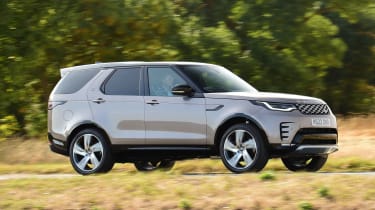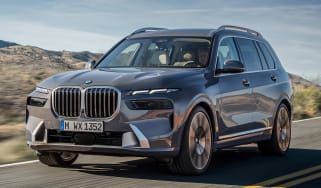Land Rover Discovery - MPG, CO2 and running costs
Mild-hybrid diesel engines offer a more efficient entry point to the Land Rover Discovery line-up

All Discovery models are equipped with a stop-start function, and mild-hybrid technology to help improve economy. The D250 and D300 offer 34.7 and 34.8mpg, respectively, on the combined cycle, while CO2 emissions range from 213g/km to 214g/km, depending on your chosen specification.
Remarkably, the defunct 2.0-litre, four-cylinder P300 was actually less efficient than its six-cylinder P360 sibling, so it’s easy to understand why that version disappeared with the facelift. However, the 27.5mpg combined number of the P360 isn’t brilliant, and neither are emissions of 232g/km.
On the plus side, you’ll benefit from either an 89- (diesel) or 90-litre (petrol) fuel tank, so the Discovery’s cruising range should be well over 500 miles.
Unfortunately, there isn’t a plug-in hybrid version of the Discovery to match its rivals, so company car drivers will be lumped with a much larger Benefit-in-Kind (BiK) tax bill. Even the least polluting model sits in the highest 37 per cent tax bracket, while alternatives such as the BMW X5 xDrive50e are in a much lower 8 per cent band (at least until 2025). Then there are the all-electric seven-seat SUVs like the Kia EV9 to consider, offering just as much space inside, but costing even less per month.
Insurance groups
Insurance premiums won't be particularly cheap, with the entry Discovery D300 S sitting in group 42, rising to group 45 for the top-of-the-range D300 and P360 Metropolitan Edition models. That’s broadly on par with its luxury SUV rivals, and avoids the top 50 band, which some versions of EV9 fall into.
There have been some historic issues with Land Rover owners getting affordable insurance coverage for their cars, although the brand has been working hard on ways to improve theft resistance.
Check if your car needs an MoT and view its complete history with our MoT History Checker...
Depreciation
As with most Land Rovers, the brand’s image and desirability means residual values remain strong – according to our experts. After a typical three-year/36,000-mile ownership period, your Discovery should hold onto between 60 to 66 per cent of its resale value, with the entry S being the strongest performer.
That’s much better than its Audi Q7 and BMW X5 rivals, the latter only maintaining between 40 to 59 per cent of its value over the same period. Limited supply of new Land Rover products have also played a part in the excellent residuals.
To get an accurate valuation on a specific model check out our valuation tool...










